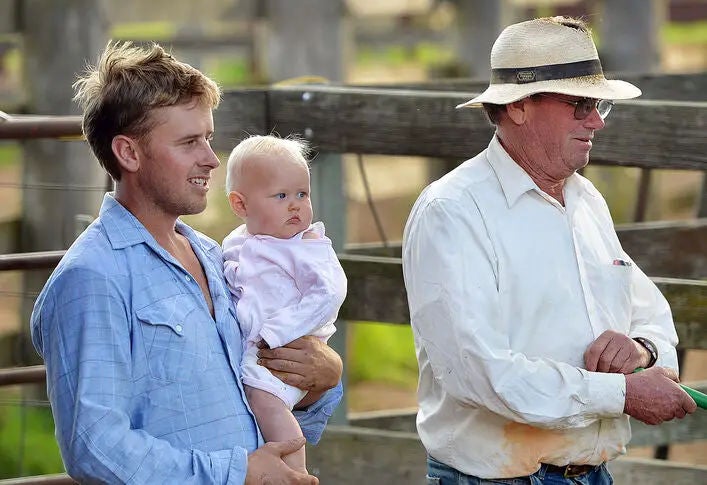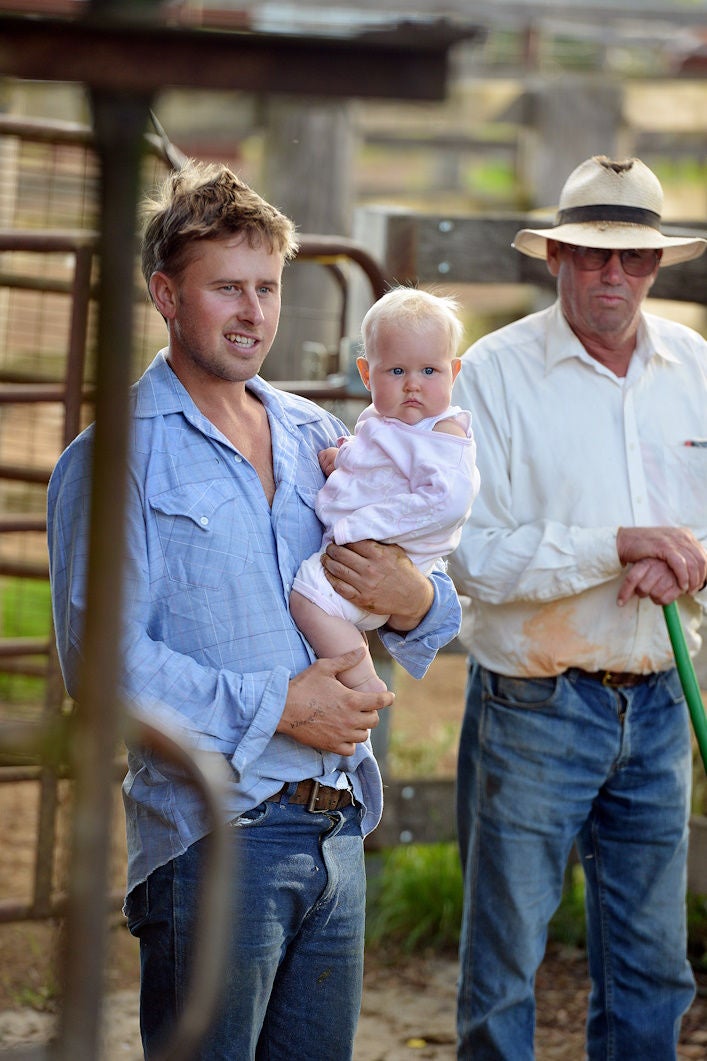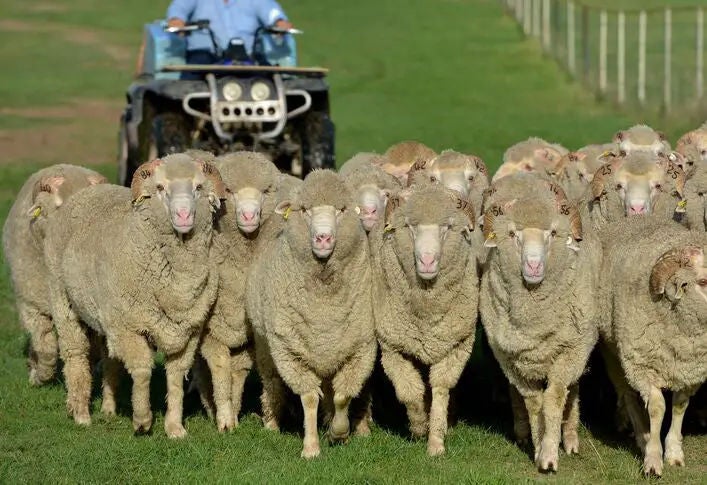Posted by on
14/11/2023
Agriculture’s reliance on seasons and markets poses significant and unique challenges, but ask Walcha’s Jock Nivison, and his take is refreshingly optimistic.
“I think for anyone who has the privilege of returning to a family farm, there are excellent opportunities.”
“Regardless of succession or scale, if you have access to land and manage it well, with a positive balance sheet the strength of rural land is that it can be leveraged to allow for business expansion.”
“A profitable agricultural business is unique in that it has the three factors of steady capital gain, positive cash flows as well as favourable tax and saving considerations.”
Acknowledging that there are challenges, and failures are a sure thing in agriculture, he believes “the great thing about failures is that you don’t forget them.”
“Apparent failure is rarely catastrophic and it generally leads to improvement.”
It’s an attitude that has clearly worked for the Nivisons, one of Australia’s pioneering farming families – Jock is the seventh generation to call the property, established in the 1830s, home.
“I feel very proud of what my family has achieved over the generations, and am fortunate to have a chance to manage the enterprise.”
And, with a progressive and successful enterprise mix developed by his late grandfather Jock and father Grant, it’s a family legacy Jock is taking to new heights.
Leveraging genetic opportunity at Yalgoo
From its origins as a Merino sheep station in the 1800s, today “Yalgoo” supports a diversity of operations – an 8000 ewe wool flock, a 2000 ewe fat lamb flock, a Merino Stud, a Poll Hereford Stud and an Angus Stud - yet it’s the genetics component of the business where Jock’s fascination lies.
“I’ve always had an interest in seedstock, a focus on genetics really seemed like the logical path – stockmen and women like their animals, they spend a lot of time observing animals under the same management and are curious as to why animals differ – and that all comes down to genetics.”
The golden rule across “Yalgoo” is genetic gain, and the evolution of objective measurement to ensure continual animal improvement is validated. This, Jock says, has been at the core of the business for three generations.
“The beauty of genetics is that, they are valuable not only because gainful genetics will increase income, they are also generally protected from inflationary pressures.”
“I would recommend self-replacing producers set benchmarks that the value of internal year-on-year genetic gain must be outpacing inflation. The good news is that because we are operating in a varied target market, often profitable genetics come at no extra cost.”
“Producers are often sceptical about the financial return of genetics. This is because income potential from genetics can be hard to tease out of a balance sheet due to all of the other moving parts in a business and seasonal factors, however if the right genes are there - they are compounding income year-on-year.”
Jock is grateful for his father and grandfathers’ foresight – the Nivison focus on genetics is clearly an inherited trait – and today the operation benefits from decades of data.

“My late grandfather Jock Nivison AM, amongst many of his achievements, was the first to bring a scanogram machine from the US to Australia to reliably measure carcass traits. He recognised that the measurement of fat and eye muscle area traits were purely subjective, and that you couldn’t rely on the human eye.”
“Back then the show ring was the ultimate arbitrator of what defined a profitable beast, and he knew things could be done better.”
This soon set the industry standard, and marked the beginning of the family’s focus on using data to drive decision making.
“My grandfather was innovative, a bit of a left-field thinker – perhaps his curiosity and attitude towards risk was reflective of that wartime era.”
Grant was also progressive, particularly in the field of performance recording, and in the late 1970s was one of the first to test and record wool micron, fleece weight, body weight, resistance to parasites and progeny comparisons.
It was a painstakingly manual system, and formed the foundation of today’s Estimated Breeding Values (EBVs).
Ahead of their time recognising the significance of good data, the Nivisons' multigenerational quest remains defined by one simple driver – to genuinely validate the profitability of their stock.
“Hard data ensures we’re not selling stories, we want to be able to point people to independently validated results to allow them to make informed decisions for the betterment of their businesses.”
Benchmarking and genetic gain driving business, and the industry, forward
With the profit drivers of a livestock business remaining consistent for the past 60 years, Jock believes the key now is “to just keep doing it better.”
“Our objective is to continue to optimise our wool and meat production, and breed an animal that can perform under environmental constraints, be they seasonal or stocking rate induced.”
“Seedstock are the tip of the spear. To channel livestock consultant Dr Phil Holmes AM, seedstock that are not challenged can be thieves.”
“Obviously our livestock need to be healthy, but like an athlete they also need to be put under pressure to ensure we find the diamonds. High stocking rates, tight matings and commercial discipline ensure we are not passing on those passengers to our clients.”
Jock thrives seeing his clients succeed, it’s at the core of the operation, to the point the Nivisons' developed their own breeding index for Merinos in 2012.
“There were 80 traits, including age stages, and a potential disconnect between breeding objectives and income, so we reduced it down to four or five traits that were highly heritable with a focus on profitability.”
The objectives of Yalgoo genetics are to aggressively decrease micron, increasing wool cut and body weight, and assist in maintaining other important traits such as parasite resistance and fertility.
And gaining a spot amongst Yalgoo’s stud stock is cut-throat.
To ensure genetic progress is rapid, the ram breeding nucleus – selected based on index ranking according to their genetic merit - is re-ranked annually, with half the flock typically replaced with genetically superior maiden ewes.

Around 4000 commercial ewe weaners are also indexed and compete with the stud bred ewes for a place in the nucleus.
The stud ewes are also subjectively classed by Dr. Phil Holmes AM annually to remove any economic fault, with a specific eye on fleece rot, dermatitis, pigment, muffle, structure, and fertility.
“Our commercial clients are at the pointy end of genetic gains, so we need to ensure we’re continually improving, so profitability doesn’t plateau. Our job is to keep our head down and ensure we don’t get distracted by intangible fads and trends.”
Across its cattle operation “Yalgoo” has developed a unique bull depreciation model incorporated into contract bull sales, again helping support client profitability, particularly for larger scale producers procuring a large number of bulls.
Armed with a data set on how long bulls are lasting, then an algorithm to work out cost per calf produced, an equitable bull price point helps support a healthy margin for clients.
“We share the risk of purchase by setting a fixed price of each calf produced, but it’s not something we stepped into without working out exactly how our bulls will perform.”
“We fertility test around 500 bulls annually to collate failure data to ensure we are working on the cost of production side of our clients businesses as well as the income side”
The underlying risk in investing in genetics is the assurance of the performance of these genes.
Across the three seedstock enterprises Yalgoo collects around 2000 tissue sampling units (TSU) to add another layer of accuracy to the predictability of their seedstock.
“We are now getting around the 80 percent accuracy mark on the highly heritable traits as yearlings.”
“Genomics give us a better indication on the gene flow of traits from parents to progeny, and as breeding technologies continue to evolve we will continue to load the dice for our clients.”
A firm believer in knowledge sharing and continual improvement, Jock is proactive in seeking advice to ensure the business continues to evolve.
Key to this has been his relationship with Dr Philip Holmes AM, who uses evidence, science and data to drive efficiencies.
“Phil has dedicated his life to making better farm businesses, and when you spend time with people you respect and can learn so much from it pushes you along, and Philip has played a big part in Yalgoo over the past 30 years.”
Jock holds his father’s support in equal regard.
“Mum and dad were really clever in their approach to business, productivity and succession, and I feel fortunate that I now have this opportunity, and still have dad as a mentor and collaborator – but more than anything it’s just really enjoyable talking bulls, rams and genetics with him.”
An experimental succession ‘stop gap’
Jock and his wife Olivia took over the operation ten years ago, but not before Jock had the unique opportunity of building a seedstock sheep business in Tasmania, in conjunction with the Bennett family from Ross.
“I completed my degree at Marcus Oldham and was keen to put a few of my business learnings into play and really sink my teeth into seedstock,” Jock explains. “Dad encouraged me to have a go and develop a few business and marketing skills. I guess it was attractive to him as it was a less capital intensive way to expand the business and got me out of his hair for a while.”
Grateful for the learning opportunity, it gave Jock free range to develop personally and professionally, and helped him finesse the tools necessary to quantify the value of genetics and to learn about being accountable for what he was selling.
Having since divested from that operation, today Jock, Olivia and their three young daughters Frankie, Eliza and Edie have grown the business, adding a finishing block that compliments the 3,230 hectare breeding block.
Jock concedes that their multi-enterprise business model goes against the grain, but with different management systems, and with good people around him, he’s is proud to be continuing to grow each enterprise.
He’s also initiating a number of programs to help repair the land, including a regeneration program improving 50 hectares of riparian zone by planting 8,000 trees.
In terms of monetising sustainability outcomes, Jock believes wool has enormous potential.
“The brand sits with a garment for a long time, and we are producing a luxury fibre for high end brands, and need to make sure that we aren’t receiving a generic price.”
“In my eyes, wool’s story as a natural, high value, long wearing fibre is becoming an increasingly important one, and one that should continue to add value.”
“The fact that wool produces quality, niche garments is only part of the sales proposition these days – the rest is branding. The producer is becoming an integral part of the retailer's brand, and if the brand is increasing in value then so should the producers’ contribution to the garment.”
Putting people and relationships first
With many of the Nivison family’s agricultural and service suppliers, consultants and client relationships spanning generations, Jock said surrounding themselves with good people was one of the keys to their success.
“People make our business work and it is the relationships we hold with these people that we find most rewarding.”
“We like to work collaboratively, we’ve had the same shearing contractors for 59 years, the same consultant for 35 years, and our farm manager has been here for 35 years.”
“Some people may view this as conservative, but if we can collaboratively help upskill and support all our staff and suppliers on our journey, rather than chopping and changing – well, we think that’s progress.”
This focus on relationships is also exemplified by their long-term association with Rabobank, and Jock considers their manager, Scott Neilson out of the Armidale branch, as another key person in their business.
“Our banking relationship is no different from any other of our business relationships – we want to deal with good people, who are competent.”
“First and foremost, Scotty is a good bloke, and the fact that he’s come out in the past and picked up lambs at lamb marking speaks volumes.”
“As a bank manager he understands the working and strategic capital needs of the business and will go in to bat for you if you can put a strong business case in front of him.”
“Banks, like Rabobank, that are nimble enough in their regulatory structure to allow good bank managers to make ‘real time, on the ground decisions’ are at a distinct advantage in agriculture, where opportunities can be brief. “
Jock also takes a holistic approach to supporting his on-farm staff, encouraging them to take any personal or professional development opportunities that come their way.
“Staffing is a huge issue across the whole industry, and you have to provide more than just a purely transactional contract to keep good people,” Jock explains. “We want our staff to be stimulated, happy and connected in their roles.”
As such, Jock has taken on a more strategic role within the business, managing relationships with staff and clients, while giving his managers responsibility and independence.
“Yalgoo” also sources graduates from Marcus Oldham to work on-farm, and Jock said seeing these people progress and succeed in their careers is a thrill.
At stud sales across the country, Jock says he’s also continually heartened hearing from clients whose grandfathers purchased their first ram from the Nivison family.
“It’s our aim to be continually improving and competitive, and help contribute to our clients’ business success. Our data may keep us accountable, but it’s maintaining these long term relationships, some spanning over three generations, that we believe is equally valuable validation that we’re on the right track.”
Global learnings to apply locally
This month, Jock will take part in Rabobank’s Global Farmers Masterclass, a ten-day knowledge sharing and personal development tour being held in New Zealand, and including clients from across the world.
Attendees will hear directly from some of the world’s largest agribusinesses, such as Fonterra, about their strategies and supply chains in dedicated panel sessions, as well as spend a morning with Rabobank global strategist Michael Every discussing global trade and consumer trends, as well as his ever-engaging insights into current geo politics.
The tour will also include on-farm tours exploring progressive New Zealand producers with a focus on sustainability and increasing efficiencies, as well as a personal development component exploring recovering from setbacks and building resilience.
Jock said he was looking forward to the trip, and was grateful to Rabobank for providing these opportunities for continued self-development, and business development.
“As my wife will attest to, I’m not very comfortable leaving the farm for an extended period of time, but I also understand the older you get, the more you realise you’ve got to learn.”
“Having the opportunity to study the systems that large scale businesses implement to ensure repeatability and reliability, combined with some of the niche marketing used by smaller businesses will hopefully help bring positive change to our business.”
“The Kiwi’s reputation for innovative yet practical solutions to agricultural questions is second only to their ability to belt us in rugby!”
The other obvious highlight, he said, would be the opportunity for networking, and learning from fellow international delegates.
